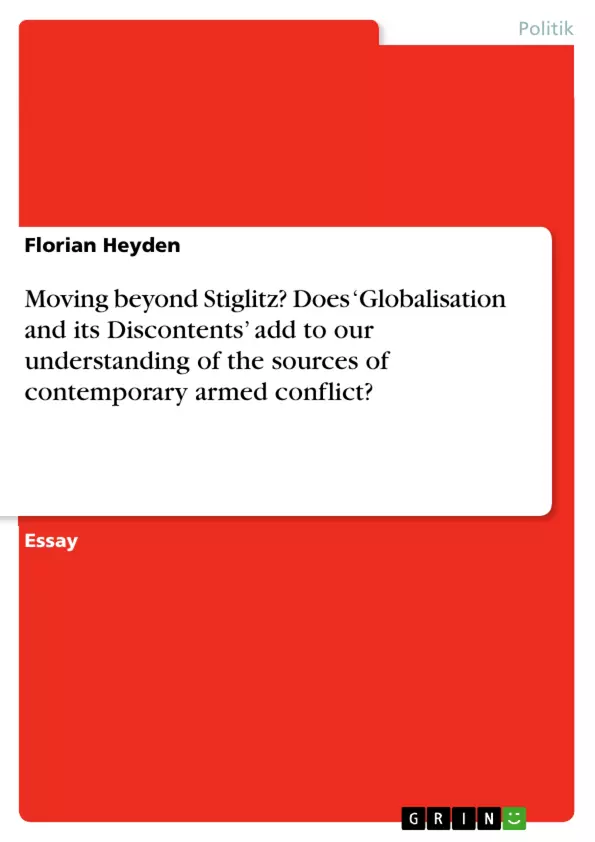With Globalisation and its Discontents, economist and writer Joseph Stiglitz wrote a devastating critique of globalisation approach and its results. His work caused much discontent among those he attacked, as much for his argument as for his apparent self-righteousness. We seek to answer two questions: Firstly, does Stiglitz' work help us to identify the causes of contemporary conflicts and secondly, could it be that Stiglitz overlooks deeper interrelations between globalisation and contemp
Inhaltsverzeichnis
- Einleitung
- 1. Teil - Über eine Idee
- 2. Teil - Über Ursachen und Katalysatoren
- 3. Teil - Über Indonesien, China und Bolivien
Zielsetzung und Themenschwerpunkte
Dieser Text analysiert Joseph Stiglitz' Werk "Globalisierung und ihre Unzufriedenheit" und untersucht dessen Beitrag zum Verständnis zeitgenössischer bewaffneter Konflikte. Es wird geprüft, ob Stiglitz die Ursachen dieser Konflikte korrekt identifiziert und ob er möglicherweise tiefere Zusammenhänge übersieht.
- Stiglitz' Kritik an der Globalisierung
- Die Rolle des IWF nach Stiglitz
- Ursachen zeitgenössischer Konflikte
- Definition und Ambiguität des Begriffs "Globalisierung"
- Der "Washington Consensus" und seine Folgen
Zusammenfassung der Kapitel
Einleitung: Die Einleitung stellt die zentrale Forschungsfrage nach dem Beitrag von Stiglitz' Werk zum Verständnis der Ursachen zeitgenössischer Konflikte. Es wird untersucht, ob Stiglitz' Kritik an der Globalisierung und dem IWF die tieferen Ursachen von Konflikten beleuchtet oder lediglich oberflächliche Aspekte beschreibt. Die Arbeit zielt darauf ab, die Innovation von Stiglitz' Analyse zu bewerten.
1. Teil - Über eine Idee: Dieses Kapitel analysiert Stiglitz' Verständnis von Globalisierung, welches er als "Washington Consensus" bezeichnet – eine ideologische und ökonomische Herangehensweise, die auf marktfundamentalistischen Prinzipien und "Schocktherapien" basiert. Der Text beleuchtet die Ambiguität des Begriffs "Globalisierung" und dessen unterschiedliche Interpretationen. Stiglitz' Kritik an diesem Modell wird in Bezug auf seine ökonomischen Auswirkungen erörtert und mit historischen Beispielen, wie der atlantischen Wirtschaft vor 1914, verglichen, um den historischen Kontext und die Kontinuität ökonomischer Verflechtungen aufzuzeigen.
2. Teil - Über Ursachen und Katalysatoren: (Kapitelzusammenfassung fehlt im Ausgangstext und muss durch eigene Recherche ergänzt werden)
3. Teil - Über Indonesien, China und Bolivien: (Kapitelzusammenfassung fehlt im Ausgangstext und muss durch eigene Recherche ergänzt werden)
Schlüsselwörter
Globalisierung, Washington Consensus, Joseph Stiglitz, IWF, zeitgenössische Konflikte, Marktliberalismus, Entwicklung, Schocktherapie, ökonomische Interdependenz.
Häufig gestellte Fragen zu "Globalisierung und ihre Unzufriedenheit" (Stiglitz)
Was ist der Inhalt dieser HTML-Datei?
Diese HTML-Datei bietet einen umfassenden Überblick über eine wissenschaftliche Arbeit, die sich mit Joseph Stiglitz' Buch "Globalisierung und ihre Unzufriedenheit" auseinandersetzt. Sie enthält ein Inhaltsverzeichnis, die Zielsetzung und die wichtigsten Themen, Zusammenfassungen der Kapitel und Schlüsselwörter. Der Fokus liegt auf der Analyse von Stiglitz' Beitrag zum Verständnis zeitgenössischer bewaffneter Konflikte und der Bewertung seiner Kritik an der Globalisierung und dem IWF.
Welche Themen werden in der Arbeit behandelt?
Die Arbeit behandelt zentrale Themen wie Stiglitz' Kritik an der Globalisierung, die Rolle des IWF nach Stiglitz, die Ursachen zeitgenössischer Konflikte, die Definition und Ambiguität des Begriffs "Globalisierung", sowie den "Washington Consensus" und seine Folgen. Sie vergleicht Stiglitz' Analyse mit historischen Beispielen, um den Kontext und die Kontinuität ökonomischer Verflechtungen aufzuzeigen.
Was ist die Zielsetzung der Arbeit?
Die Arbeit untersucht, ob Stiglitz die Ursachen zeitgenössischer Konflikte korrekt identifiziert und ob er möglicherweise tiefere Zusammenhänge übersieht. Sie bewertet den Beitrag von Stiglitz' Werk zum Verständnis dieser Konflikte und analysiert die Innovation seiner Analyse. Im Kern geht es darum, die Gültigkeit und Tiefe von Stiglitz' Kritik an der Globalisierung und ihren Auswirkungen auf die Entstehung von Konflikten zu überprüfen.
Welche Kapitel werden behandelt und was ist ihr Inhalt?
Die Arbeit besteht aus drei Teilen. Der erste Teil analysiert Stiglitz' Verständnis von Globalisierung, insbesondere den "Washington Consensus", und beleuchtet die Ambiguität des Begriffs "Globalisierung". Der zweite und dritte Teil, die sich mit den Ursachen von Konflikten und Fallstudien (Indonesien, China, Bolivien) befassen, haben im vorliegenden Text noch keine vollständigen Zusammenfassungen.
Welche Schlüsselwörter beschreiben die Arbeit?
Die Schlüsselwörter umfassen: Globalisierung, Washington Consensus, Joseph Stiglitz, IWF, zeitgenössische Konflikte, Marktliberalismus, Entwicklung, Schocktherapie, und ökonomische Interdependenz.
Wo finde ich die vollständigen Kapitelzusammenfassungen?
Die vollständigen Kapitelzusammenfassungen für Teil 2 und Teil 3 fehlen im Ausgangstext und müssen durch eigene Recherche ergänzt werden.
- Quote paper
- M.A. Florian Heyden (Author), 2005, Moving beyond Stiglitz? Does ‘Globalisation and its Discontents’ add to our understanding of the sources of contemporary armed conflict?, Munich, GRIN Verlag, https://www.grin.com/document/52123



